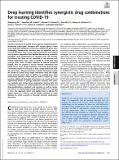Deep learning identifies synergistic drug combinations for treating COVID-19
Author(s)
Jin, Wengong; Stokes, Jonathan; Eastman, Richard T.; Itkin, Zina; Zakharov, Alexey V.; Collins, James J.; Jaakkola, Tommi S; Barzilay, Regina; ... Show more Show less
DownloadPublished version (1.324Mb)
Publisher Policy
Publisher Policy
Article is made available in accordance with the publisher's policy and may be subject to US copyright law. Please refer to the publisher's site for terms of use.
Terms of use
Metadata
Show full item recordAbstract
Effective treatments for COVID-19 are urgently needed. However, discovering single-agent therapies with activity against severe acute respiratory syndrome coronavirus 2 (SARS-CoV-2) has been challenging. Combination therapies play an important role in antiviral therapies, due to their improved efficacy and reduced toxicity. Recent approaches have applied deep learning to identify synergistic drug combinations for diseases with vast preexisting datasets, but these are not applicable to new diseases with limited combination data, such as COVID-19. Given that drug synergy often occurs through inhibition of discrete biological targets, here we propose a neural network architecture that jointly learns drug−target interaction and drug−drug synergy. The model consists of two parts: a drug−target interaction module and a target−disease association module. This design enables the model to utilize drug−target interaction data and single-agent antiviral activity data, in addition to available drug−drug combination datasets, which may be small in nature. By incorporating additional biological information, our model performs significantly better in synergy prediction accuracy than previous methods with limited drug combination training data. We empirically validated our model predictions and discovered two drug combinations, remdesivir and reserpine as well as remdesivir and IQ-1S, which display strong antiviral SARS-CoV-2 synergy in vitro. Our approach, which was applied here to address the urgent threat of COVID-19, can be readily extended to other diseases for which a dearth of chemical−chemical combination data exists.
Date issued
2021-09Department
Massachusetts Institute of Technology. Computer Science and Artificial Intelligence Laboratory; Massachusetts Institute of Technology. Department of Biological Engineering; Massachusetts Institute of Technology. Synthetic Biology Center; Massachusetts Institute of Technology. Institute for Medical Engineering & Science; Massachusetts Institute of Technology. Department of Electrical Engineering and Computer ScienceJournal
Proceedings of the National Academy of Sciences
Publisher
National Academy of Sciences
Citation
Jin, Wengong et al. "Deep learning identifies synergistic drug combinations for treating COVID-19." Proceedings of the National Academy of Sciences 118, 39 (September 2021): e2105070118. © 2021 the Author(s)
Version: Final published version
ISSN
0027-8424
1091-6490